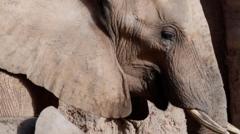The Supreme Court's decision has sparked a debate on animal rights, legality, and the ethical treatment of nonhuman animals.
**Court Rules Elephants Are Not People: A Legal Perspective on Animal Rights**

**Court Rules Elephants Are Not People: A Legal Perspective on Animal Rights**
A recent ruling by the Colorado Supreme Court reaffirms the legal distinction between animals and humans.
The Colorado Supreme Court has ruled that elephants are not legally recognized as persons, rejecting a petition from an animal rights group that sought to move five elephants—Missy, Kimba, Lucky, LouLou, and Jambo—from a local zoo to a sanctuary. The Nonhuman Rights Project (NRP) filed a habeas corpus claim, which typically allows for a legal challenge to unlawful imprisonment. However, the Court's unanimous ruling stated that the habeas corpus process applies only to humans, thus dismissing the appeal.
Justice Maria Berkenkotter articulated that the case hinged on whether elephants could be classified as 'persons' under the law, and emphasized that their cognitive and social abilities do not confer personhood. The court described the elephants as "majestic" but reiterated they do not have the same liberty rights accorded to human beings.
This ruling follows NRP’s assertion that the five elephants at the Cheyenne Mountain Zoo are effectively imprisoned and suffer from trauma and chronic stress, thereby warranting relocation to a sanctuary. They cited the profound emotional complexity of these elephants as justification for seeking their freedom. Cheyenne Mountain Zoo, however, defended its care for the elephants, describing the lawsuit as "frivolous" and a misuse of legal resources for fundraising purposes.
NRP expressed disappointment following the ruling, stating it underscores a "clear injustice" that limits liberty only to humans. They compared their struggle to other social justice movements that face initial setbacks in challenging entrenched societal norms. This ruling continues a broader dialogue regarding animal rights, with previous legal attempts—such as the case of Happy the elephant at Bronx Zoo—similarly concluding that nonhuman animals do not possess personhood in the eyes of the law, which raises questions about the legal framework surrounding animal welfare and rights.
Justice Maria Berkenkotter articulated that the case hinged on whether elephants could be classified as 'persons' under the law, and emphasized that their cognitive and social abilities do not confer personhood. The court described the elephants as "majestic" but reiterated they do not have the same liberty rights accorded to human beings.
This ruling follows NRP’s assertion that the five elephants at the Cheyenne Mountain Zoo are effectively imprisoned and suffer from trauma and chronic stress, thereby warranting relocation to a sanctuary. They cited the profound emotional complexity of these elephants as justification for seeking their freedom. Cheyenne Mountain Zoo, however, defended its care for the elephants, describing the lawsuit as "frivolous" and a misuse of legal resources for fundraising purposes.
NRP expressed disappointment following the ruling, stating it underscores a "clear injustice" that limits liberty only to humans. They compared their struggle to other social justice movements that face initial setbacks in challenging entrenched societal norms. This ruling continues a broader dialogue regarding animal rights, with previous legal attempts—such as the case of Happy the elephant at Bronx Zoo—similarly concluding that nonhuman animals do not possess personhood in the eyes of the law, which raises questions about the legal framework surrounding animal welfare and rights.




















